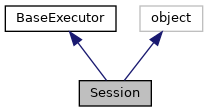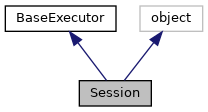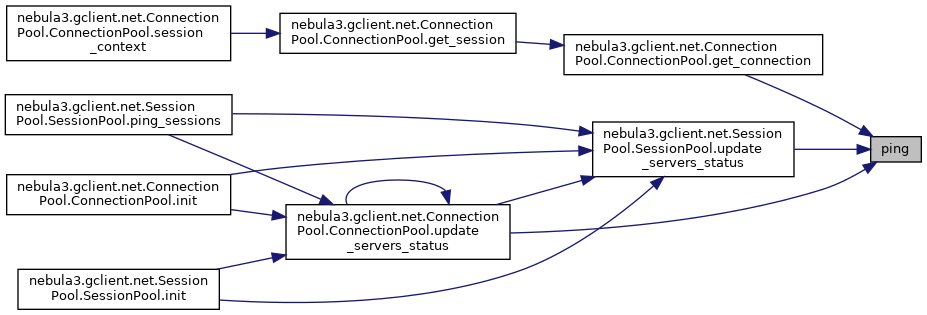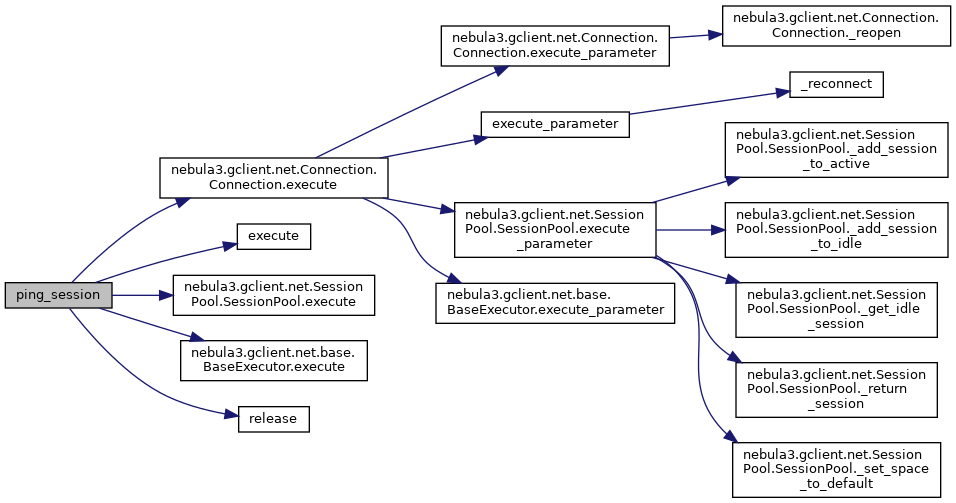Session Class Reference
 Inheritance diagram for Session:
Inheritance diagram for Session: Collaboration diagram for Session:
Collaboration diagram for Session:Public Member Functions | |
| def | __init__ (self, "Connection" connection, AuthResult auth_result, "ConnectionPool" pool, retry_connect=True, execution_retry_count=0, retry_interval_seconds=1) |
| def | execute (self, stmt) |
| def | execute_parameter (self, stmt, params) |
| def | execute_json (self, stmt) |
| def | execute_json_with_parameter (self, stmt, params) |
| def | release (self) |
| def | ping (self) |
| def | ping_session (self) |
| def | __del__ (self) |
 Public Member Functions inherited from BaseExecutor Public Member Functions inherited from BaseExecutor | |
| ResultSet | execute_parameter (self, str stmt, Optional[Dict[str, Any]] params) |
| bytes | execute_json_with_parameter (self, str stmt, Optional[Dict[str, Any]] params) |
| ResultSet | execute (self, str stmt) |
| bytes | execute_json (self, str stmt) |
| def | execute_py (self, str stmt, Optional[Dict[str, Any]] params=None) |
Detailed Description
Definition at line 28 of file Session.py.
Constructor & Destructor Documentation
◆ __init__()
| def __init__ | ( | self, | |
| "Connection" | connection, | ||
| AuthResult | auth_result, | ||
| "ConnectionPool" | pool, | ||
retry_connect = True, |
|||
execution_retry_count = 0, |
|||
retry_interval_seconds = 1 |
|||
| ) |
Initialize the Session object. :param connection: The connection object associated with the session. :param auth_result: The result of the authentication process. :param pool: The pool object where the session was created. :param retry_connect: A boolean indicating whether to retry the connection if it fails. :param execution_retry_count: The number of attempts to retry the execution upon encountering an execution error(-1005), with the default being 0 (no retries). :param retry_interval_seconds: The interval between connection retries in seconds.
Definition at line 29 of file Session.py.
Member Function Documentation
◆ execute()
| def execute | ( | self, | |
| stmt | |||
| ) |
execute statement :param stmt: the ngql :return: ResultSet
Definition at line 60 of file Session.py.
 Here is the caller graph for this function:
Here is the caller graph for this function:◆ execute_json()
| def execute_json | ( | self, | |
| stmt | |||
| ) |
execute statement and return the result as a JSON bytes
Date and Datetime will be returned in UTC
JSON struct:
{
"results": [
{
"columns": [],
"data": [
{
"row": [
"row-data"
],
"meta": [
"metadata"
]
}
],
"latencyInUs": 0,
"spaceName": "",
"planDesc ": {
"planNodeDescs": [
{
"name": "",
"id": 0,
"outputVar": "",
"description": {
"key": ""
},
"profiles": [
{
"rows": 1,
"execDurationInUs": 0,
"totalDurationInUs": 0,
"otherStats": {}
}
],
"branchInfo": {
"isDoBranch": false,
"conditionNodeId": -1
},
"dependencies": []
}
],
"nodeIndexMap": {},
"format": "",
"optimize_time_in_us": 0
},
"comment ": ""
}
],
"errors": [
{
"code": 0,
"message": ""
}
]
}
:param stmt: the ngql
:return: JSON bytes
Definition at line 123 of file Session.py.
◆ execute_json_with_parameter()
| def execute_json_with_parameter | ( | self, | |
| stmt, | |||
| params | |||
| ) |
execute statement and return the result as a JSON bytes
Date and Datetime will be returned in UTC
JSON struct:
{
"results": [
{
"columns": [],
"data": [
{
"row": [
"row-data"
],
"meta": [
"metadata"
]
}
],
"latencyInUs": 0,
"spaceName": "",
"planDesc ": {
"planNodeDescs": [
{
"name": "",
"id": 0,
"outputVar": "",
"description": {
"key": ""
},
"profiles": [
{
"rows": 1,
"execDurationInUs": 0,
"totalDurationInUs": 0,
"otherStats": {}
}
],
"branchInfo": {
"isDoBranch": false,
"conditionNodeId": -1
},
"dependencies": []
}
],
"nodeIndexMap": {},
"format": "",
"optimize_time_in_us": 0
},
"comment ": ""
}
],
"errors": [
{
"code": 0,
"message": ""
}
]
}
:param stmt: the ngql
:param params: parameter map
:return: JSON bytes
Definition at line 186 of file Session.py.
 Here is the call graph for this function:
Here is the call graph for this function: Here is the caller graph for this function:
Here is the caller graph for this function:◆ execute_parameter()
| def execute_parameter | ( | self, | |
| stmt, | |||
| params | |||
| ) |
execute statement :param stmt: the ngql :param params: parameter map :return: ResultSet
Definition at line 68 of file Session.py.
 Here is the call graph for this function:
Here is the call graph for this function: Here is the caller graph for this function:
Here is the caller graph for this function:◆ ping()
| def ping | ( | self | ) |
ping at connection level check the connection is valid :return: True or False
Definition at line 302 of file Session.py.
 Here is the caller graph for this function:
Here is the caller graph for this function:◆ ping_session()
| def ping_session | ( | self | ) |
ping at session level, check whether the session is usable
Definition at line 311 of file Session.py.
 Here is the call graph for this function:
Here is the call graph for this function:◆ release()
| def release | ( | self | ) |
release the connection to pool, and the session couldn't been use again :return:
Definition at line 291 of file Session.py.
 Here is the caller graph for this function:
Here is the caller graph for this function:The documentation for this class was generated from the following file:
- nebula3/gclient/net/Session.py









